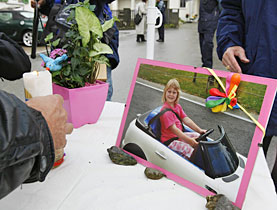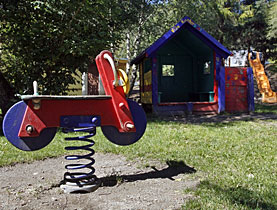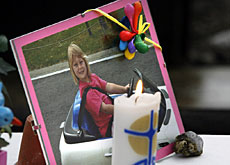A year after Ylenia murder, no alarm system yet

The case of a five-year-old girl abducted and murdered in Switzerland a year ago led to much soul searching about what could have be done to save her.
Under discussion is a mobile phone photo alarm system but this is unlikely to come into force before 2010. Other proposals to sound the alarm bells have also been put forward.
Ylenia, from Appenzell in eastern Switzerland, was reported missing on July 31, 2007, prompting a massive police search. Her body was found in mid-September.
Her abductor, a 67-year-old Swiss man, committed suicide. Police later said that the suspect, who is thought to have planned his crime in advance, had poisoned Ylenia using a solvent.
Speaking to the Schweizer Illustrierte magazine, Ylenia’s mother, Charlotte Lenhard, said that her daughter was always in her thoughts.
“When I hear children playing outside who used to play with Ylenia, it’s almost more than I can bear,” she said.
The Ylenia case shocked Switzerland as child abductions and murders are still rare in the country. Politicians were swift to come up with a response.
The phone photo system, which was approved by parliament last December, would involve sending a picture of the missing child to phones – via MMS or Multimedia Messaging Service – with a description and a number to call.
A similar system using text messaging is already used in Canada, the United States and France.
Assessment
The countrywide MMS scheme would be coordinated by the Swiss cantons, which are responsible for such matters under the Swiss federal system.
The proposal is therefore currently under review by a working group of the Conference of Cantonal Justice and Police Directors.
Stefan Leutert, a scientific collaborator at the organisation, told swissinfo many aspects of the system – a first for Switzerland – still needed to be discussed.
“An important question that must be clarified is who would activate a Switzerland-wide alarm with MMS. When you activate it you have to be sure that the child has really been abducted and that he or she hasn’t gone to play with a friend rather than coming straight home from school,” said Leutert.
“So there are not just technical questions which have to be considered but also practical procedures,” he explained, adding that frequent false alarms would harm the system’s effectiveness.
A final report will be issued by 2009, with the system – if approved by the conference – likely to be introduced in 2010. A text message scheme including a link to the internet, containing all the information about the child, is also being assessed.
Additional measure
Leutert said that any alarm system, to which people would have to sign up, would be in addition to current measures. Until now police have used the media to transmit case information, he said.
A photo alert is also no guarantee that a child would be found. “In the Ylenia case nobody saw her again after her disappearance,” said Leutert.
Calls for an alert are not new. The Fredi foundation, a private body which helps in the search for missing children, has been long campaigning for more action.
Earlier this month it handed in a petition of 32,500 signatures to the authorities calling for an immediate alarm system – a petition which was started before the Ylenia case.
“We would like to see this abduction alert in place as fast as possible, but above all we’d like a real and effective collaboration between the cantonal police and the population,” the foundation’s operational director Diane Burgy told swissinfo.
People are willing to help, she said. Ylenia’s body was eventually found by a civilian.
“We also find it lamentable that we currently don’t use the internet to flag up when a child has gone missing,” she added.
Crucial hours
Burgy says that it is the first few hours that are crucial after a child goes missing. Surrounding areas and countries also need to be alerted straightaway, she said.
The authorities are reported to have waited six days before informing neighbouring cantons and ten days before alerting Austria during the Ylenia case.
Ylenia’s mother told Schweizer Illustrierte that she was disappointed that immediate action had not been taken over an alarm. Burgy is also of the opinion that more must be done.
“People say that most children who disappear run away,” she said. “It’s also true that we’ve had few criminal disappearances in Switzerland but does this justify that we don’t do anything? We have to prepare ourselves for the future.”
swissinfo, Isobel Leybold-Johnson
Ylenia from Appenzell in eastern Switzerland was last seen at a swimming pool on July 31, say police, who did not initially release her surname in keeping with Swiss privacy laws.
That evening police found her backpack, cycle helmet and scooter beside a path in woods around 30 kilometres away.
On August 1, in the same forest, police found the body of a 67-year-old Swiss man who had shot himself. A day earlier he had shot and injured a 46-year-old man, who fled the scene.
Ylenia’s corpse was discovered on September 15. It was later revealed that she had been poisoned. Officials said her body did not reveal any signs of a sexual attack, but that this did not exclude the possibility that the abduction motive was sexual.
Earlier this week it was announced that the case was officially closed.
The Ylenia Foundation has been set up by Charlotte Lenhard in memory of her daughter. Donated money will go to needy children.
In the US, the Amber Alert is a voluntary partnership between law-enforcement agencies, broadcasters and transportation agencies to activate an urgent bulletin in the most serious child-abduction cases. It is named after a nine-year-old girl who was kidnapped and murdered in 1996.
England and Wales and Canada have adopted similar schemes, based on the US example.
French authorities can flash up electronic missing child information on motorway signboards within 30 minutes of a confirmed case of abduction under its alarm plan.
Ministers decided against a Europe-wide alert system earlier this year – a move which had the backing of Kate and Gerry McCann, parents of the missing British girl Madeleine.
It was decided that countries would concentrate on installing their own schemes and cross-border cooperation.

In compliance with the JTI standards
More: SWI swissinfo.ch certified by the Journalism Trust Initiative



You can find an overview of ongoing debates with our journalists here. Please join us!
If you want to start a conversation about a topic raised in this article or want to report factual errors, email us at english@swissinfo.ch.